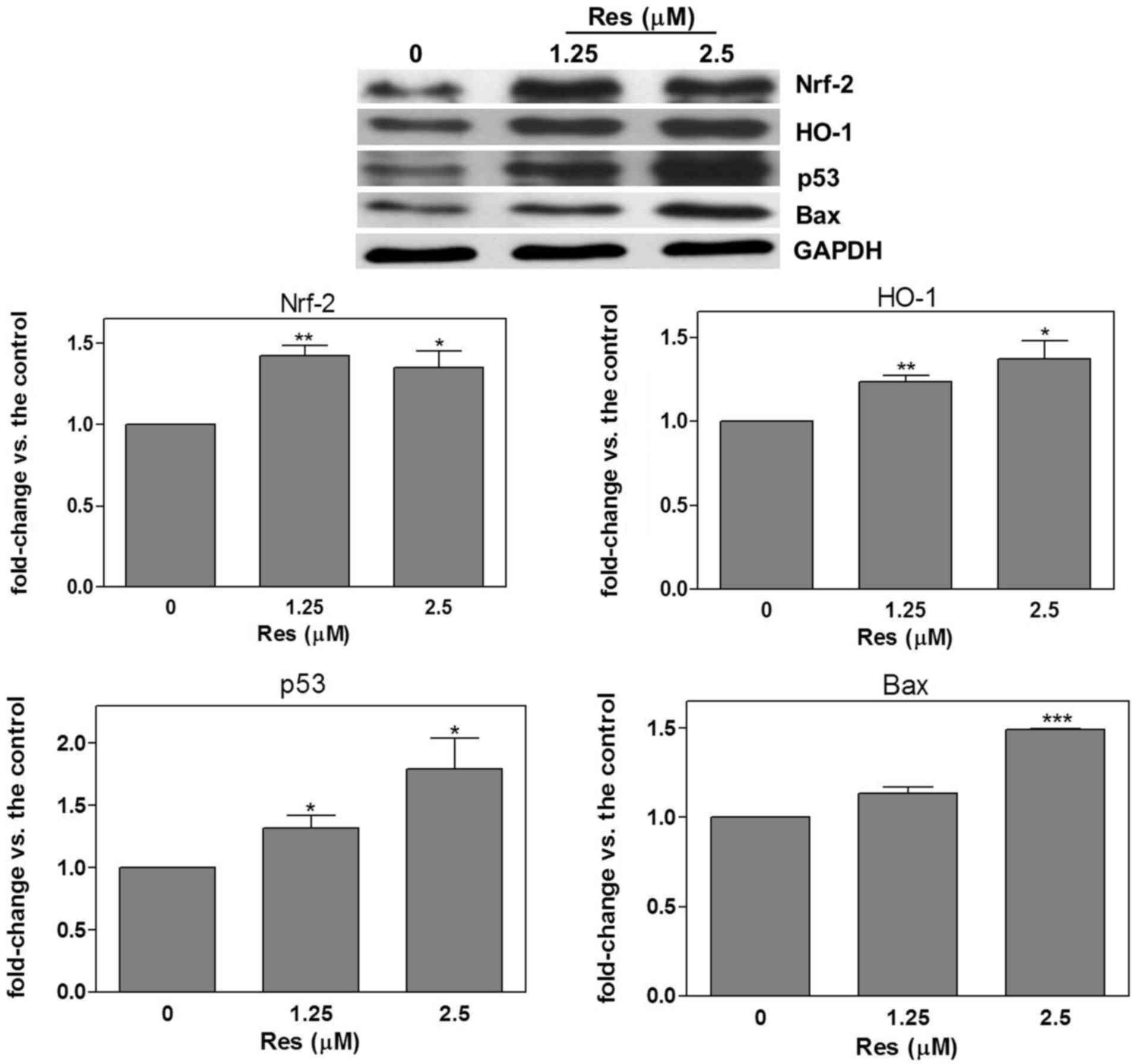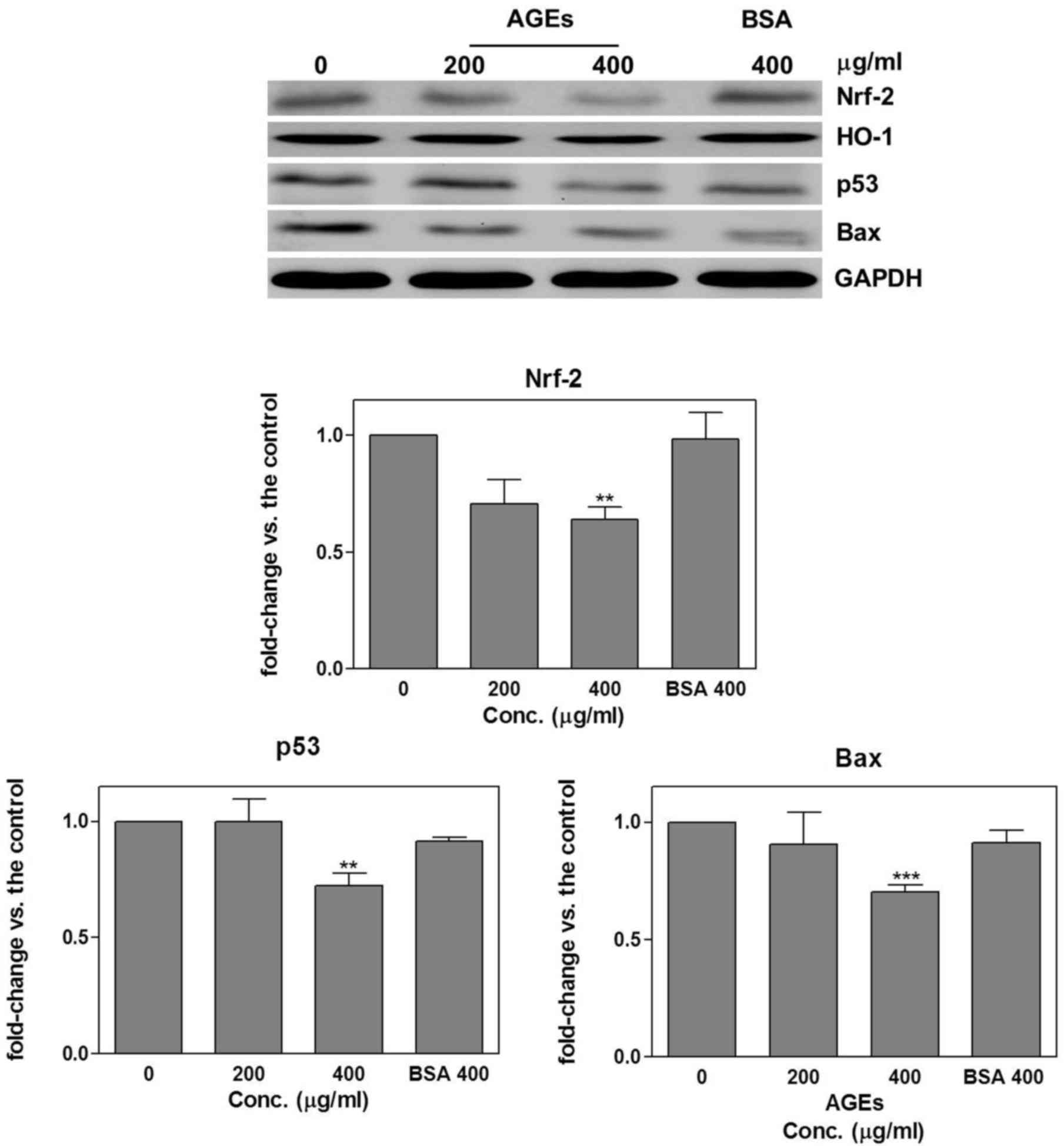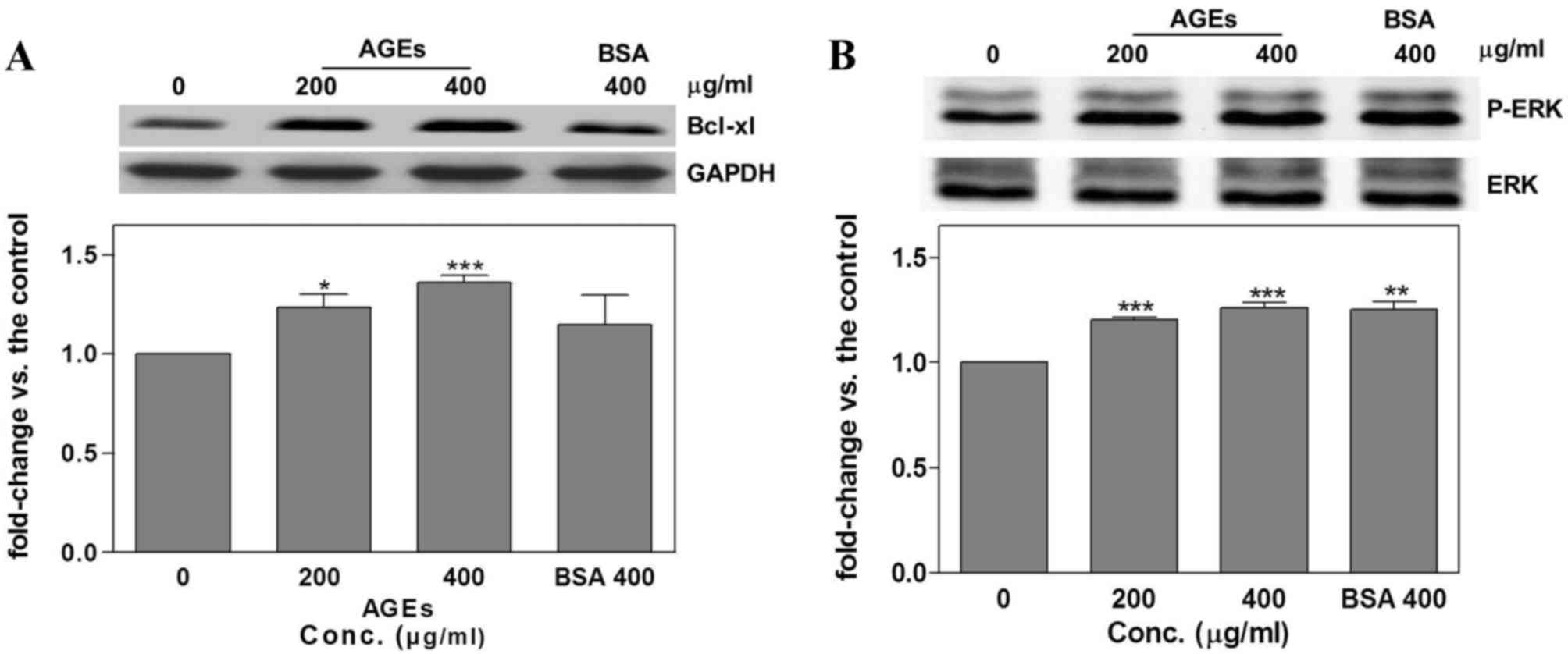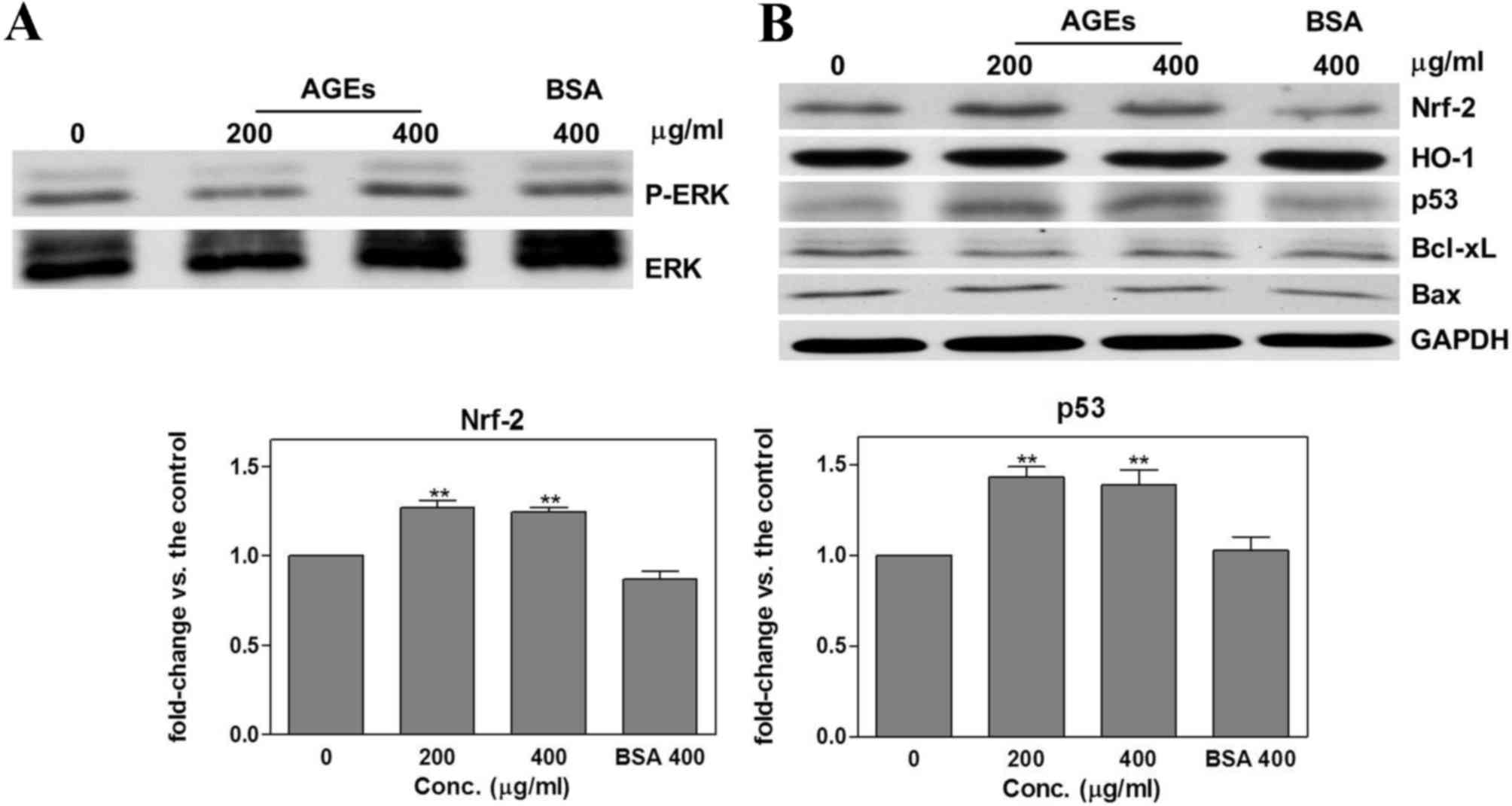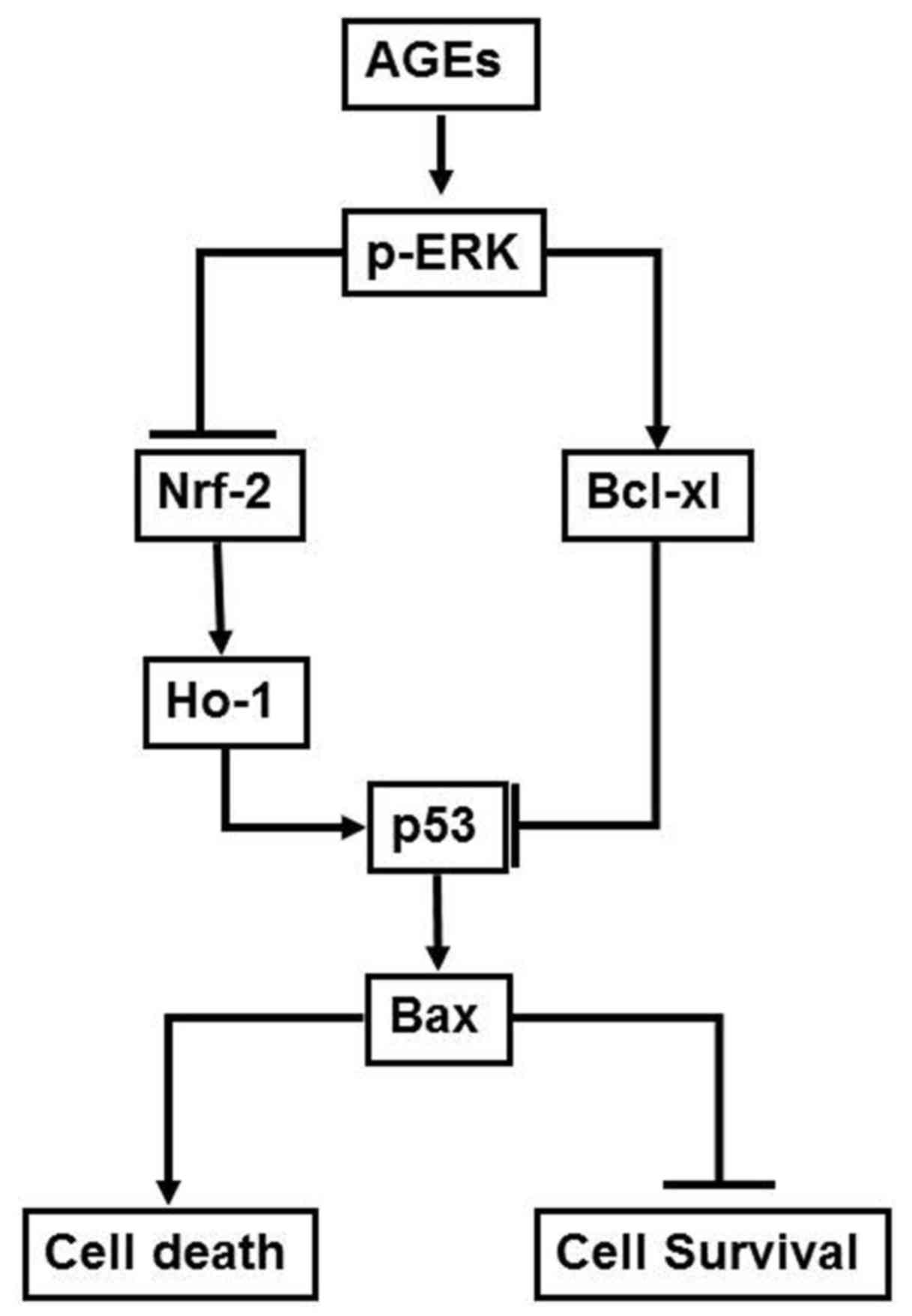|
1
|
Kasper M and Funk RH: Age-related changes
in cells and tissues due to advanced glycation end products (AGEs).
Arch Gerontol Geriatr. 32:233–243. 2001. View Article : Google Scholar : PubMed/NCBI
|
|
2
|
Ramasamy R, Vannucci SJ, Yan SS, Herold K,
Yan SF and Schmidt AM: Advanced glycation end products and RAGE: A
common thread in aging, diabetes, neurodegeneration, and
inflammation. Glycobiology. 15:16R–28R. 2005. View Article : Google Scholar : PubMed/NCBI
|
|
3
|
Luth HJ, Ogunlade V, Kuhla B,
Kientsch-Engel R, Stahl P, Webster J, Arendt T and Münch G: Age-
and stage-dependent accumulation of advanced glycation end products
in intracellular deposits in normal and Alzheimer's disease brains.
Cereb Cortex. 15:211–220. 2005. View Article : Google Scholar : PubMed/NCBI
|
|
4
|
Munch G, Thome J, Foley P, Schinzel R and
Riederer P: Advanced glycation endproducts in ageing and
Alzheimer's disease. Brain Res Brain Res Rev. 23:134–143. 1997.
View Article : Google Scholar : PubMed/NCBI
|
|
5
|
Thorpe SR and Baynes JW: Role of the
Maillard reaction in diabetes mellitus and diseases of aging. Drugs
Aging. 9:69–77. 1996. View Article : Google Scholar : PubMed/NCBI
|
|
6
|
Schmidt AM, Yan SD, Yan SF and Stern DM:
The biology of the receptor for advanced glycation end products and
its ligands. Biochim Biophys Acta. 1498:99–111. 2000. View Article : Google Scholar : PubMed/NCBI
|
|
7
|
Sato T, Iwaki M, Shimogaito N, Wu X,
Yamagishi S and Takeuchi M: TAGE (toxic AGEs) theory in diabetic
complications. Curr Mol Med. 6:351–358. 2006. View Article : Google Scholar : PubMed/NCBI
|
|
8
|
Basta G, Schmidt AM and De Caterina R:
Advanced glycation end products and vascular inflammation:
Implications for accelerated atherosclerosis in diabetes.
Cardiovasc Res. 63:582–592. 2004. View Article : Google Scholar : PubMed/NCBI
|
|
9
|
Thornalley PJ: Glycation free adduct
accumulation in renal disease: The new AGE. Pediatr Nephrol.
20:1515–1522. 2005. View Article : Google Scholar : PubMed/NCBI
|
|
10
|
Takeuchi M, Kikuchi S, Sasaki N, Suzuki T,
Watai T, Iwaki M, Bucala R and Yamagishi S: Involvement of advanced
glycation end-products (AGEs) in Alzheimer's disease. Curr
Alzheimer Res. 1:39–46. 2004. View Article : Google Scholar : PubMed/NCBI
|
|
11
|
Sato T, Shimogaito N, Wu X, Kikuchi S,
Yamagishi S and Takeuchi M: Toxic advanced glycation end products
(TAGE) theory in Alzheimer's disease. Am J Alzheimers Dis Other
Demen. 21:197–208. 2006. View Article : Google Scholar : PubMed/NCBI
|
|
12
|
Takeuchi M, Bucala R, Suzuki T, Ohkubo T,
Yamazaki M, Koike T, Kameda Y and Makita Z: Neurotoxicity of
advanced glycation end-products for cultured cortical neurons. J
Neuropathol Exp Neurol. 59:1094–1105. 2000. View Article : Google Scholar : PubMed/NCBI
|
|
13
|
Choei H, Sasaki N, Takeuchi M, Yoshida T,
Ukai W, Yamagishi S, Kikuchi S and Saito T: Glyceraldehyde-derived
advanced glycation end products in Alzheimer's disease. Acta
Neuropathol. 108:189–193. 2004. View Article : Google Scholar : PubMed/NCBI
|
|
14
|
Bhawal UK, Ozaki Y, Nishimura M, Sugiyama
M, Sasahira T, Nomura Y, Sato F, Fujimoto K, Sasaki N, Ikeda MA, et
al: Association of expression of receptor for advanced glycation
end products and invasive activity of oral squamous cell carcinoma.
Oncology. 69:246–255. 2005. View Article : Google Scholar : PubMed/NCBI
|
|
15
|
Cai Q, Li BY, Gao HQ, Zhang JH, Wang JF,
Yu F, Yin M and Zhang Z: Grape seed procyanidin b2 inhibits human
aortic smooth muscle cell proliferation and migration induced by
advanced glycation end products. Biosci Biotechnol Biochem.
75:1692–1697. 2011. View Article : Google Scholar : PubMed/NCBI
|
|
16
|
Takino J, Yamagishi S and Takeuchi M:
Cancer malignancy is enhanced by glyceraldehyde-derived advanced
glycation end-products. J Oncol. 2010:7398522010. View Article : Google Scholar : PubMed/NCBI
|
|
17
|
Ko SY, Ko HA, Shieh TM, Chang WC, Chen HI,
Chang SS and Lin IH: Cell migration is regulated by AGE-RAGE
interaction in human oral cancer cells in vitro. PLoS One.
9:e1105422014. View Article : Google Scholar : PubMed/NCBI
|
|
18
|
Wu CH, Wu TY, Li CC, Lui MT, Chang KW and
Kao SY: Impact of diabetes mellitus on the prognosis of patients
with oral squamous cell carcinoma: A retrospective cohort study.
Ann Surg Oncol. 17:2175–2183. 2010. View Article : Google Scholar : PubMed/NCBI
|
|
19
|
Motohashi H, Katsuoka F, Engel JD and
Yamamoto M: Small Maf proteins serve as transcriptional cofactors
for keratinocyte differentiation in the Keap1-Nrf2 regulatory
pathway. Proc Natl Acad Sci USA. 101:6379–6384. 2004. View Article : Google Scholar : PubMed/NCBI
|
|
20
|
Ishii T, Itoh K, Takahashi S, Sato H,
Yanagawa T, Katoh Y, Bannai S and Yamamoto M: Transcription factor
Nrf2 coordinately regulates a group of oxidative stress-inducible
genes in macrophages. J Biol Chem. 275:16023–16029. 2000.
View Article : Google Scholar : PubMed/NCBI
|
|
21
|
Ishii T, Itoh K and Yamamoto M: Roles of
Nrf2 in activation of antioxidant enzyme genes via antioxidant
responsive elements. Methods Enzymol. 348:182–190. 2002. View Article : Google Scholar : PubMed/NCBI
|
|
22
|
Itoh K, Chiba T, Takahashi S, Ishii T,
Igarashi K, Katoh Y, Oyake T, Hayashi N, Satoh K, Hatayama I, et
al: An Nrf2/small Maf heterodimer mediates the induction of phase
II detoxifying enzyme genes through antioxidant response elements.
Biochem Biophys Res Commun. 236:313–322. 1997. View Article : Google Scholar : PubMed/NCBI
|
|
23
|
Hsieh CY, Hsiao HY, Wu WY, Liu CA, Tsai
YC, Chao YJ, Wang DL and Hsieh HJ: Regulation of shear-induced
nuclear translocation of the Nrf2 transcription factor in
endothelial cells. J Biomed Sci. 16:122009. View Article : Google Scholar : PubMed/NCBI
|
|
24
|
Mann GE, Rowlands DJ, Li FY, de Winter P
and Siow RC: Activation of endothelial nitric oxide synthase by
dietary isoflavones: Role of NO in Nrf2-mediated antioxidant gene
expression. Cardiovasc Res. 75:261–274. 2007. View Article : Google Scholar : PubMed/NCBI
|
|
25
|
Itoh K, Mochizuki M, Ishii Y, Ishii T,
Shibata T, Kawamoto Y, Kelly V, Sekizawa K, Uchida K and Yamamoto
M: Transcription factor Nrf2 regulates inflammation by mediating
the effect of 15-deoxy-Delta(12,14)-prostaglandin j(2). Mol Cell
Biol. 24:36–45. 2004. View Article : Google Scholar : PubMed/NCBI
|
|
26
|
Chen XL, Dodd G, Thomas S, Zhang X,
Wasserman MA, Rovin BH and Kunsch C: Activation of Nrf2/ARE pathway
protects endothelial cells from oxidant injury and inhibits
inflammatory gene expression. Am J Physiol Heart Circ Physiol.
290:H1862–H1870. 2006. View Article : Google Scholar : PubMed/NCBI
|
|
27
|
Mochizuki M, Ishii Y, Itoh K, Iizuka T,
Morishima Y, Kimura T, Kiwamoto T, Matsuno Y, Hegab AE, Nomura A,
et al: Role of 15-deoxy delta(12,14) prostaglandin J2 and Nrf2
pathways in protection against acute lung injury. Am J Respir Crit
Care Med. 171:1260–1266. 2005. View Article : Google Scholar : PubMed/NCBI
|
|
28
|
Harada N, Kanayama M, Maruyama A, Yoshida
A, Tazumi K, Hosoya T, Mimura J, Toki T, Maher JM, Yamamoto M and
Itoh K: Nrf2 regulates ferroportin 1-mediated iron efflux and
counteracts lipopolysaccharide-induced ferroportin 1 mRNA
suppression in macrophages. Arch Biochem Biophys. 508:101–109.
2011. View Article : Google Scholar : PubMed/NCBI
|
|
29
|
Bell KF, Al-Mubarak B, Fowler JH, Baxter
PS, Gupta K, Tsujita T, Chowdhry S, Patani R, Chandran S, Horsburgh
K, et al: Mild oxidative stress activates Nrf2 in astrocytes, which
contributes to neuroprotective ischemic preconditioning. Proc Natl
Acad Sci USA. 108:E1–E2; author reply E3-4. 2011. View Article : Google Scholar : PubMed/NCBI
|
|
30
|
Riley RJ and Workman P: DT-diaphorase and
cancer chemotherapy. Biochem Pharmacol. 43:1657–1669. 1992.
View Article : Google Scholar : PubMed/NCBI
|
|
31
|
Clark JE, Foresti R, Green CJ and
Motterlini R: Dynamics of haem oxygenase-1 expression and bilirubin
production in cellular protection against oxidative stress. Biochem
J 348 Pt. 3:615–619. 2000. View Article : Google Scholar
|
|
32
|
Jyrkkanen HK, Kansanen E, Inkala M, Kivelä
AM, Hurttila H, Heinonen SE, Goldsteins G, Jauhiainen S, Tiainen S,
Makkonen H, et al: Nrf2 regulates antioxidant gene expression
evoked by oxidized phospholipids in endothelial cells and murine
arteries in vivo. Circ Res. 103:e1–e9. 2008. View Article : Google Scholar : PubMed/NCBI
|
|
33
|
Nioi P, McMahon M, Itoh K, Yamamoto M and
Hayes JD: Identification of a novel Nrf2-regulated antioxidant
response element (ARE) in the mouse NAD(P)H: Quinone oxidoreductase
1 gene: Reassessment of the ARE consensus sequence. Biochem J.
374:337–348. 2003. View Article : Google Scholar : PubMed/NCBI
|
|
34
|
You A, Nam CW, Wakabayashi N, Yamamoto M,
Kensler TW and Kwak MK: Transcription factor Nrf2 maintains the
basal expression of Mdm2: An implication of the regulation of p53
signaling by Nrf2. Arch Biochem Biophys. 507:356–364. 2011.
View Article : Google Scholar : PubMed/NCBI
|
|
35
|
Lee YM, Auh QS, Lee DW, Kim JY, Jung HJ,
Lee SH and Kim EC: Involvement of Nrf2-mediated upregulation of
heme oxygenase-1 in mollugin-induced growth inhibition and
apoptosis in human oral cancer cells. Biomed Res Int.
2013:2106042013.PubMed/NCBI
|
|
36
|
Ko SY, Lin YP, Lin YS and Chang SS:
Advanced glycation end products enhance amyloid precursor protein
expression by inducing reactive oxygen species. Free Radic Biol
Med. 49:474–480. 2010. View Article : Google Scholar : PubMed/NCBI
|
|
37
|
Vairaktaris E, Spyridonidou S, Goutzanis
L, Vylliotis A, Lazaris A, Donta I, Perrea D, Yapijakis C and
Patsouris E: Diabetes and oral oncogenesis. Anticancer Res.
27:4185–4193. 2007.PubMed/NCBI
|
|
38
|
Girtan M, Zurac S, Stăniceanu F, Bastian
A, Popp C, Nichita L, Laba E and Forna N: Oral epithelial
hyperplasia in diabetes mellitus. Rom J Intern Med. 47:201–203.
2009.PubMed/NCBI
|
|
39
|
Vairaktaris E, Kalokerinos G, Goutzanis L,
Yapijakis C, Derka S, Vassiliou S, Spyridonidou S, Vylliotis A,
Nkenke E, Lazaris A and Patsouris E: Diabetes enhances cell
proliferation but not Bax/Bcl-2-mediated apoptosis during oral
oncogenesis. Int J Oral Maxillofac Surg. 37:60–65. 2008. View Article : Google Scholar : PubMed/NCBI
|
|
40
|
Ulrich S, Loitsch SM, Rau O, von Knethen
A, Brüne B, Schubert-Zsilavecz M and Stein JM: Peroxisome
proliferator-activated receptor gamma as a molecular target of
reveratrol-induced modulation of polyamine metabolism. Cancer Res.
66:7348–7354. 2006. View Article : Google Scholar : PubMed/NCBI
|
|
41
|
Frazzi R, Valli R, Tamagnini I, Casali B,
Latruffe N and Merli F: Resveratrolmediated apoptosis of hodgkin
lymphoma cells invovles SIRT1 inhibition and FOXO3a
hyperacetylation. Int J Cancer. 132:1013–1021. 2013. View Article : Google Scholar : PubMed/NCBI
|
|
42
|
Yang Q, Wang B, Zang W, Wang X, Liu Z, Li
W and Jia J: Resveratrol inhibits the growth of gastric cancer by
inducing G1 phase arrest and senescence in a Sirt1-dependent
manner. PLoS One. 8:e706272013. View Article : Google Scholar : PubMed/NCBI
|
|
43
|
Elattar TM and Virji AS: The effect of red
wine and its components on growth and proliferation of human oral
squamous carcinoma cells. Anticancer Res. 19:5407–5414.
1999.PubMed/NCBI
|
|
44
|
Shan Z, Yang G, Xiang W, Pei-jun W and Bin
Z: Effects of resveratrol on oral squamous cell carcinoma (OSCC)
cells in vitro. J Cancer Res Clin Oncol. 140:371–374. 2014.
View Article : Google Scholar : PubMed/NCBI
|
|
45
|
Kim SH, Kim HJ, Lee MH, Yu SK, Kim CS,
Kook JK, Chun HS, Park E, Lee SY, Kim SG, et al: Resveratrol
induces apoptosis of KB human oral cancer cells. J Korean Soc Appl
Biol Chem. 54:966–971. 2011. View Article : Google Scholar
|
|
46
|
Chipuk JE, Kuwana T, Bouchier-Hayes L,
Droin NM, Newmeyer DD, Schuler M and Green DR: Direct activation of
Bax by p53 mediates mitochondrial membrane permeabilization and
apoptosis. Science. 303:1010–1014. 2004. View Article : Google Scholar : PubMed/NCBI
|
|
47
|
Li G, Xie N, Yao Y, Zhang Y, Guo J, Feng
Y, Lv F, Xiao RP and Cao CM: Identification of PI3K regulatory
subunit p55γ as a novel inhibitor of vascular smooth muscle cell
proliferation and neointimal formation. Cardiovasc Res. 105:75–85.
2014. View Article : Google Scholar : PubMed/NCBI
|















